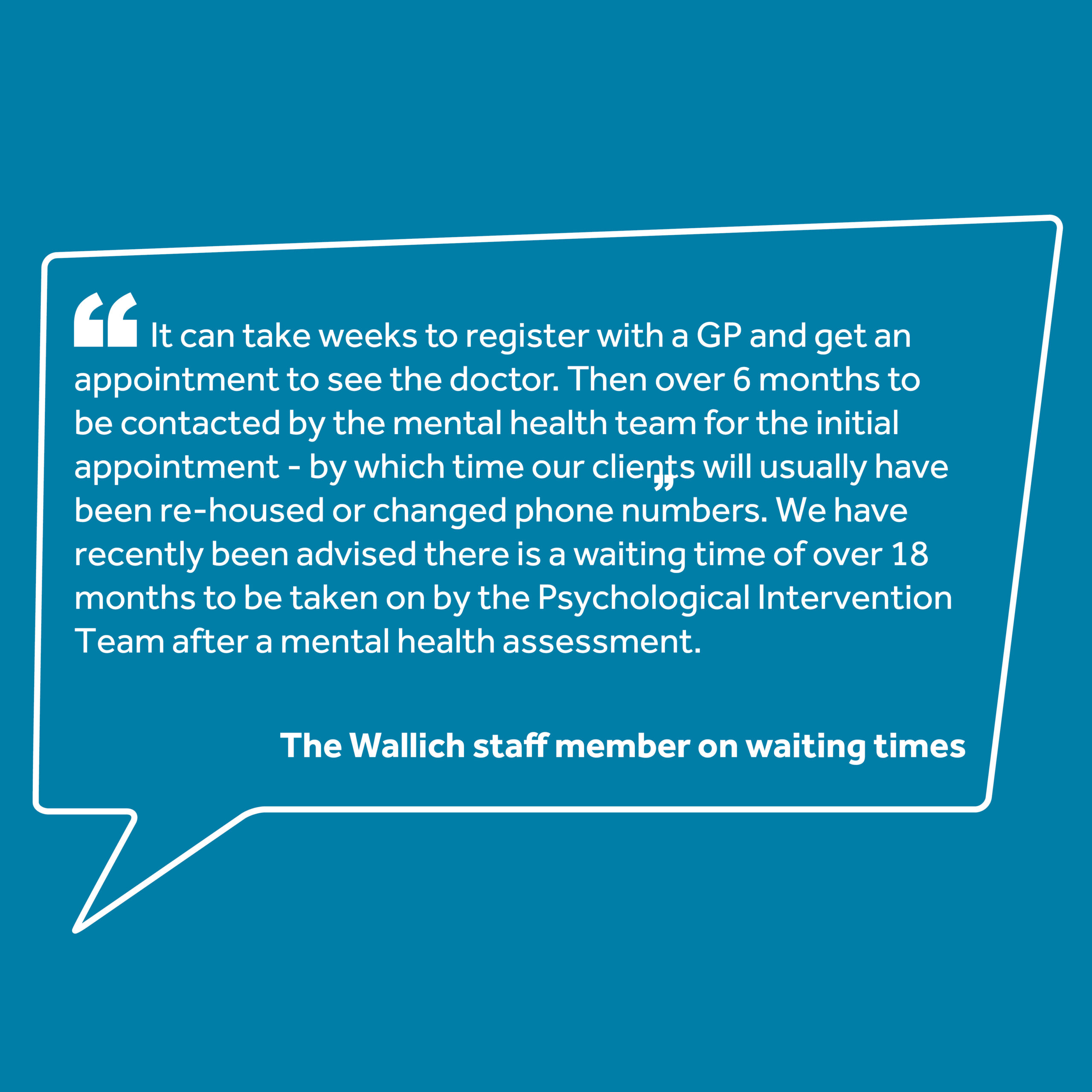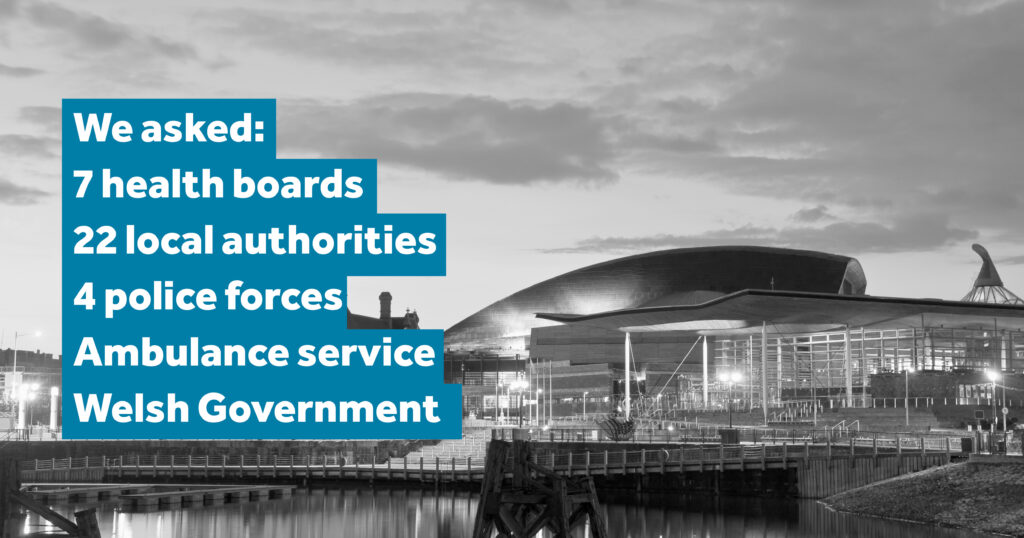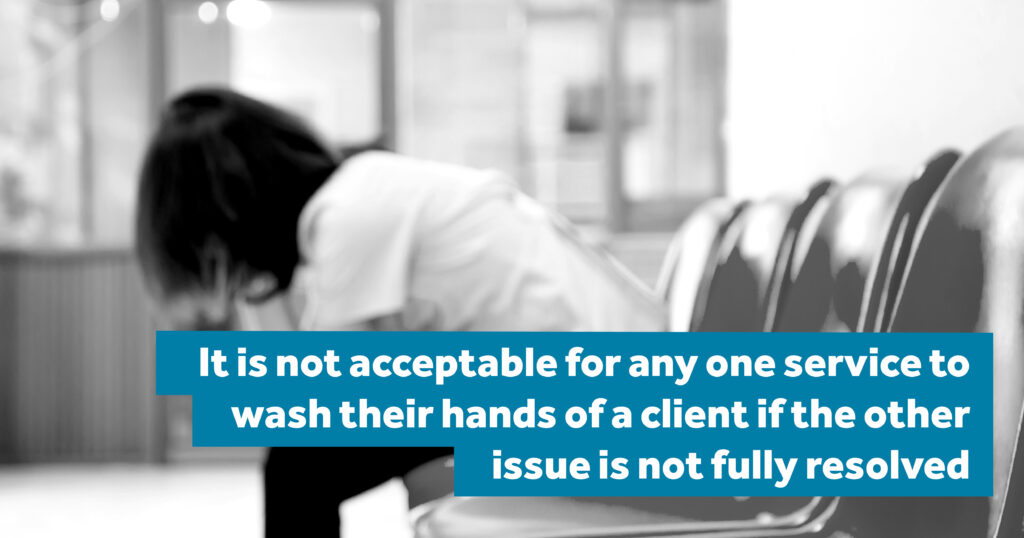
Charity incident reports show thousands of incidents of self-harm, suicide, overdose and aggressive behaviour.
Following the concerning results of a staff survey in the summer of 2022, The Wallich, Wales’ leading homelessness charity has undertaken an investigation into the current landscape of crisis mental health provision for people experiencing homelessness in Wales.
After extensive research over the past eight months, they have published a report which has found that the mental health emergency disproportionally affects people experiencing homelessness.
The report will be released at an event sponsored by Jack Sargeant MS at The Pierhead on Tuesday 28 March – 12pm.

83% found it difficult to access the right support for clients (63% really difficult)
8% said that no help was available
Just 3% of staff said appropriate support was available
481 incidents of self-harm or suicidal ideation
294 incidents relating to drug or alcohol overdoses
1,508 incidents of erratic or aggressive behaviour
During the early pandemic, between March and October 2020, The Wallich’s specially trained support staff helped more than 4,000 people experiencing homelessness. They continue to support some of the most vulnerable people in Wales.
The Wallich’s staff say they are increasingly concerned and frustrated by their inability to get help and support for people in mental health crisis.
They were surveyed in August 2022 about their experiences.
“We strongly feel that access to the right mental health care at the right time is an essential prerequisite to permanently ending homelessness.
“People with experiences of homelessness, and more widely those with experiences of trauma, are disproportionately more likely to suffer from poor mental health than the general population.
“Without the right care and support, they are at greater risk of declining wellbeing to the point of crisis, at which point it is typically housing support workers like our frontline staff who respond, sometimes even saving lives.”
“Mental health teams take too long to react. It can be over 10 weeks after an incident for first contact with the client.
“It feels like we are supposed to keep them safe in the meantime, which is very difficult. Obviously as a team we go above and beyond, but we are not trained to do mental health’s job.”

The Wallich then went on to analyse 4,216 records across three years, pre and post pandemic, on their incident management system and found:
481 incidents of self-harm or suicidal ideation
294 incidents relating to drug or alcohol overdoses
1,508 incidents of erratic or aggressive behaviour
The charity concludes through further analysis that most of these incidents are a result of or related to mental health crises.
The report provides a number of detailed, often distressing, case studies to illustrate what these incidents look like in reality for the people experiencing mental health crises and those working on the front line to support them.
The complex referral pathways and systems being stretched to their limits, means it is very difficult for people in crisis to get any help at all from dedicated mental health services, meaning emergency callouts are the only option for worried staff.
In 1,845 incidents police were called out, and on 861 occasions an ambulance was called out. This serves to further retraumatise and in some cases, criminalises vulnerable people.
“In a properly functioning system, we do not believe it should be the role of police or ambulance services to respond to an individual experiencing a severe crisis.
“However, that is the reality at present, as the only option to prevent serious harm and save lives in an emergency.”

In order to get an accurate picture of the current state of mental health service provision across Wales, The Wallich then sent a series of FOIs to each of the seven health boards, as well as to the 22 local authorities, the four police forces, the ambulance service, and to Welsh Government.
The responses show that services are highly fragmented, with a real diversity of provision and referral routes across different areas.
In the report, The Wallich details what referral pathways exist, what eligibility criteria is in place, what provision there is for co-occurring mental health and substance use needs, and what work is being done to build partnerships to share good practice and skills.
Often the details provided by the FOI’s do not match the reality of the experiences of frontline homelessness staff.
The charity also reflects on the importance of recording accurate and useful data on mental health and homelessness, to ensure both needs are fully addressed.
Jack Sargeant, Member of the Senedd for Alyn and Deeside, said:
“I am really grateful to The Wallich for putting this report together. The Wallich are on the frontline of what is a really difficult and worsening housing situation.
“I have written before about the need for trauma informed public services or as I called them “kinder” services. If we don’t recognise the trauma people have been through and tailor services to it, we are letting them down twice. Once by not protecting them from trauma and again by not recognising it.
“Thank you again to The Wallich for doing so much to promote a trauma informed agenda. I would encourage everyone to engage with this work.”

The report makes a number of recommendations to Health Boards, Local Authorities and other bodies, including the charity themselves.
It also is careful not to assign blame to any service – acknowledging services are all stretched to their limits, and that there is much good work happening across Wales. The Wallich concludes by outlining that steps needed to tackle the issue are not revolutionary.
Their recommendations focus on ways to re-incentivise partnership working, to develop holistic, person-centred services. They cite the Trauma Informed Wales Framework as a great example of how this could work in practice, by putting questions of accessibility right at the heart of service design.
“The feeling of constantly being turned away from services, of being left ‘on hold’, is something that repeatedly came up as retraumatising our clients. A ‘no wrong door approach’, where people are helped wherever they present, would be genuinely transformational.
“We must all be committed to ensuring that everybody experiencing homelessness and severe mental ill health is able to access the right support at the right time.”